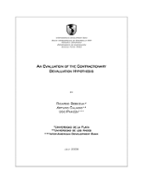An Evaluation of the Contractionary Devaluation Hypothesis
Date
Jul 2006
Recent empirical and theoretical literature on the impact of real exchange rate devaluations on economic performance questions the traditional expansionary effect generated within standard Mundell-Fleming models. Contractionary devaluations may arise when firms face maturity or currency mismatches that, when faced with real exchange rate depreciations, lead to balance-sheet effects that erode firms' wealth and lead to an output contraction. While some authors show that the standard Mundell-Fleming result may hold even in the presence of currency mismatches, others point out that, if the balance sheet effect is large enough, devaluations can be contractionary. Using a large panel of 57 countries across the world and various newly constructed measures of dollarization, we test whether the balance sheet effect hypothesis has been relevant during the past decades in explaining economic downturns. Additionally, we explore the channels through which devaluations can be contractionary; in particular, we explore whether investment and consumption decisions are negatively affected by exchange rate devaluations under currency mismatches.



